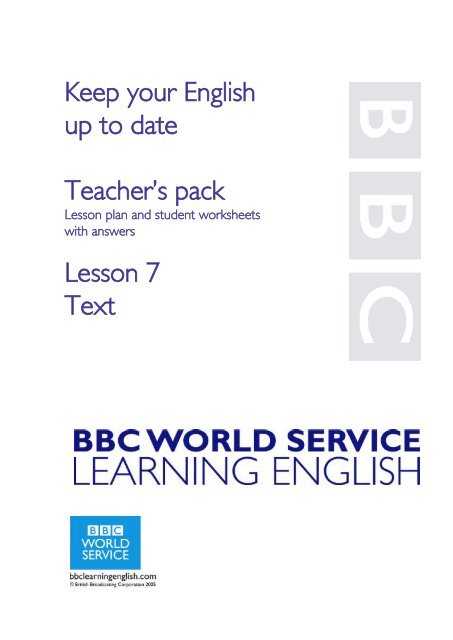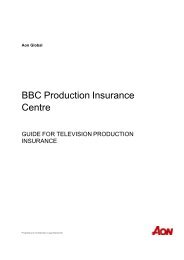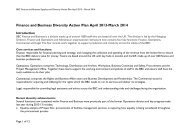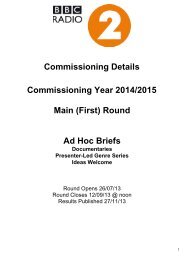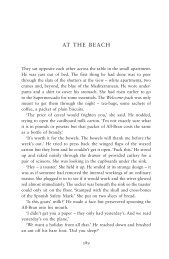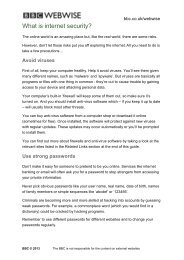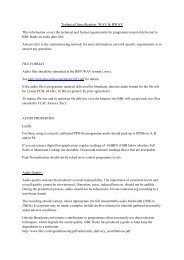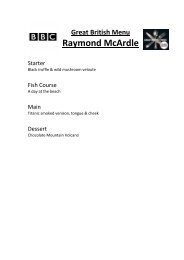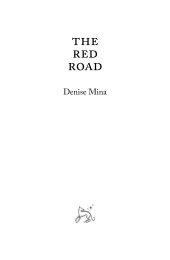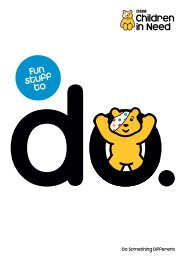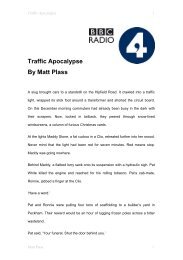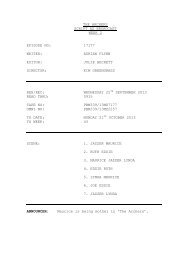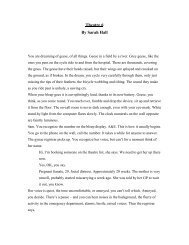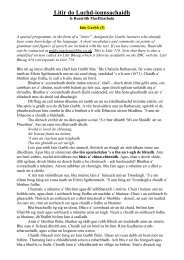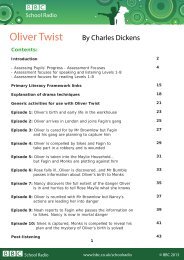Keep your English up to date Teacher's pack Lesson 7 Text - BBC
Keep your English up to date Teacher's pack Lesson 7 Text - BBC
Keep your English up to date Teacher's pack Lesson 7 Text - BBC
You also want an ePaper? Increase the reach of your titles
YUMPU automatically turns print PDFs into web optimized ePapers that Google loves.
<strong>Keep</strong> <strong>your</strong> <strong>English</strong><br />
<strong>up</strong> <strong>to</strong> <strong>date</strong><br />
Teacher’s <strong>pack</strong><br />
<strong>Lesson</strong> plan and student worksheets<br />
with answers<br />
<strong>Lesson</strong> 7<br />
<strong>Text</strong>
<strong>BBC</strong> Learning <strong>English</strong> – <strong>Keep</strong> <strong>your</strong> <strong>English</strong> Up <strong>to</strong> Date<br />
<strong>Lesson</strong> Plan: <strong>Teacher's</strong> notes<br />
<strong>Lesson</strong> 7: <strong>Text</strong><br />
CONTENTS<br />
1. Level, <strong>to</strong>pic, language, aims, materials<br />
2. <strong>Lesson</strong> stages<br />
3. Answers<br />
4. Tapescripts<br />
5. Student worksheets 1, 2, 3<br />
Level: Intermediate and above<br />
Topic: Mobile phones and communication<br />
Language: <strong>Text</strong>, texting, texter<br />
Aims: Listening skills – A short talk<br />
Understanding text language<br />
Materials: Worksheet 1 – Introduc<strong>to</strong>ry speaking and vocabulary exercises,<br />
listening section 1<br />
Worksheet 2 - Listening section 2<br />
Worksheet 3 – Extra work: Vocabulary and writing<br />
Tapescript – Available in teacher’s notes<br />
Recording of the talk – Available online at bbclearningenglish.com<br />
This plan was downloaded from:<br />
bbclearningenglish.com/radio/specials/1728_<strong>up</strong><strong>to</strong><strong>date</strong>/page8.shtml<br />
<strong>Keep</strong> <strong>your</strong> <strong>English</strong> Up <strong>to</strong> Date © <strong>BBC</strong> Learning <strong>English</strong><br />
<strong>Lesson</strong> Plan: <strong>Teacher's</strong> notes Page 2 of 10<br />
bbclearningenglish.com
<strong>BBC</strong> Learning <strong>English</strong> – <strong>Keep</strong> <strong>your</strong> <strong>English</strong> Up <strong>to</strong> Date<br />
<strong>Lesson</strong> Plan: <strong>Teacher's</strong> notes<br />
<strong>Lesson</strong> 7: <strong>Text</strong><br />
LESSON STAGES<br />
A<br />
Explain <strong>to</strong> the students that they are going <strong>to</strong> listen <strong>to</strong> a talk by Professor David Crystal<br />
and that the talk is about the way the <strong>English</strong> language changes. This particular talk is<br />
about a development in technology that has brought a new word in <strong>to</strong> the language<br />
B<br />
Hand out Student Worksheet 1. Students do Speaking Exercise 1 in small gro<strong>up</strong>s or<br />
pairs.<br />
C<br />
Students do the Vocabulary Exercise 2, without dictionaries at first.<br />
Practise the pronunciation of the vocabulary, as they will hear it in the talk.<br />
D<br />
Students read Listening Exercise 3 and then listen <strong>to</strong> Section 1 of the talk.<br />
They answer the questions.<br />
Students listen again and answer Listening Exercise 4<br />
E<br />
Hand out Student Worksheet 2<br />
Students read and do Listening Exercise 5<br />
Students listen <strong>to</strong> section 2 of the talk and check their answer for Listening Exercise 5<br />
F<br />
Students try <strong>to</strong> answer Listening Exercise 6. They listen again <strong>to</strong> Listening Section 2 <strong>to</strong><br />
check/complete their answers.<br />
G<br />
If you wish <strong>to</strong> do some extra work with the class, hand out Student Worksheet 3<br />
For the vocabulary exercise, give the students copies of the tapescript and play the<br />
complete talk as they read.<br />
The language work looks at ‘text speak’ – the language used when writing texts.<br />
<strong>Keep</strong> <strong>your</strong> <strong>English</strong> Up <strong>to</strong> Date © <strong>BBC</strong> Learning <strong>English</strong><br />
<strong>Lesson</strong> Plan: <strong>Teacher's</strong> notes Page 3 of 10<br />
bbclearningenglish.com
<strong>BBC</strong> Learning <strong>English</strong> – <strong>Keep</strong> <strong>your</strong> <strong>English</strong> Up <strong>to</strong> Date<br />
<strong>Lesson</strong> Plan: <strong>Teacher's</strong> notes<br />
<strong>Lesson</strong> 7: <strong>Text</strong><br />
TAPESCRIPTS<br />
Listening Section 1<br />
'<strong>Text</strong>' is one of these new words that have come in<strong>to</strong> <strong>English</strong> as a result of the internet<br />
revolution and especially, this time, the cell phone revolution. Cell phones didn't exist<br />
well, 5, 10 years ago, they weren't around and as soon as they came along, people started<br />
using them <strong>to</strong> send messages <strong>to</strong> each other. So, first as a noun, you had the noun 'text' and<br />
now you have the verb '<strong>to</strong> text', which is <strong>to</strong> send a written message using a mobile phone<br />
or a cell phone if you use that expression instead.<br />
It isn't new actually. Although the verb '<strong>to</strong> text' is a modern feature of <strong>to</strong>day's <strong>English</strong>, you<br />
can actually trace it back <strong>to</strong> the 16th century when '<strong>to</strong> text', in those days, was <strong>to</strong> write<br />
something in very large letters, in capital letters, in 'text hand'.<br />
Listening Section 2<br />
And, if you look it <strong>up</strong> in a big dictionary these days, you'll often be <strong>to</strong>ld "this verbal use is<br />
now rather rare". Well it was rare until about 4 or 5 years ago. Since then of course,<br />
everybody's been using it, and it's produced a whole new family of words.<br />
You can now 'text' somebody of course, but you can be engaged in the noun 'texting'. And<br />
then you've got 'text messaging' which is a fuller form of the idea of texting somebody.<br />
And the people who send messages <strong>to</strong> each other are called 'texters', and the whole<br />
language of abbreviated communication that you can use - introducing abbreviated forms<br />
in<strong>to</strong> <strong>your</strong> text message, in order <strong>to</strong> make it as succinct and as quick <strong>to</strong> send as possible.<br />
Well, what's the name for that? There isn't an agreed name at the moment - but I call it<br />
'text speak'.<br />
<strong>Keep</strong> <strong>your</strong> <strong>English</strong> Up <strong>to</strong> Date © <strong>BBC</strong> Learning <strong>English</strong><br />
<strong>Lesson</strong> Plan: <strong>Teacher's</strong> notes Page 4 of 10<br />
bbclearningenglish.com
<strong>BBC</strong> Learning <strong>English</strong> – <strong>Keep</strong> <strong>your</strong> <strong>English</strong> Up <strong>to</strong> Date<br />
<strong>Lesson</strong> Plan: <strong>Teacher's</strong> notes<br />
<strong>Lesson</strong> 7: <strong>Text</strong><br />
ANSWER KEY<br />
VOCABULARY<br />
2.<br />
a. revolution a complete change in the way people do<br />
something<br />
b. cell phone a mobile telephone<br />
c. <strong>to</strong> trace something back <strong>to</strong> the past <strong>to</strong> follow the his<strong>to</strong>ry of something, from the<br />
present <strong>to</strong> the past<br />
d. verbal spoken rather than written<br />
e. abbreviated shortened or reduced in length<br />
f. succinct clear and not containing many words<br />
LISTENING SECTION 1<br />
3.<br />
a. text<br />
b. a noun and a verb<br />
c. a new use of an old verb<br />
4.<br />
a. True – as a result of the cell phone revolution<br />
b. False – you had the noun and now you have the verb<br />
c. False – texting is by phone only<br />
d. True – <strong>to</strong> write in capital letters<br />
LISTENING SECTION 2<br />
5.<br />
Real words are texter, texting, text messaging<br />
6.<br />
a. False – it was rare until about 4 or 5 years ago<br />
b. True – introducing abbreviated forms in<strong>to</strong> <strong>your</strong> text<br />
c. False – there isn’t an agreed name yet<br />
<strong>Keep</strong> <strong>your</strong> <strong>English</strong> Up <strong>to</strong> Date © <strong>BBC</strong> Learning <strong>English</strong><br />
<strong>Lesson</strong> Plan: <strong>Teacher's</strong> notes Page 5 of 10<br />
bbclearningenglish.com
<strong>BBC</strong> Learning <strong>English</strong> – <strong>Keep</strong> <strong>your</strong> <strong>English</strong> Up <strong>to</strong> Date<br />
<strong>Lesson</strong> Plan: <strong>Teacher's</strong> notes<br />
<strong>Lesson</strong> 7: <strong>Text</strong><br />
EXTRA WORK<br />
1.<br />
a. <strong>to</strong> exist<br />
b. capital letters<br />
c. <strong>to</strong> be engaged in something<br />
LANGUAGE<br />
2.<br />
a. vi. <strong>to</strong>day<br />
b. iv. before<br />
c. i. love<br />
d. viii. lots of love<br />
e. ii. no one<br />
f. vii. someone<br />
g. iii. thanks<br />
h. v. weekend<br />
3.<br />
a. LOL<br />
b. 2DAY, B4, NO1, SUM1<br />
c. WKND<br />
d. LUV<br />
e. THNX (c and d), SUM1 (b and d)<br />
4.<br />
a. R U OK?<br />
b. GR8<br />
c. NE1<br />
d. I C<br />
e. 2moro<br />
f. C U L8R<br />
g. BTW<br />
h. wan2<br />
<strong>Keep</strong> <strong>your</strong> <strong>English</strong> Up <strong>to</strong> Date © <strong>BBC</strong> Learning <strong>English</strong><br />
<strong>Lesson</strong> Plan: <strong>Teacher's</strong> notes Page 6 of 10<br />
bbclearningenglish.com
<strong>BBC</strong> Learning <strong>English</strong> – <strong>Keep</strong> <strong>your</strong> <strong>English</strong> Up <strong>to</strong> Date<br />
<strong>Text</strong><br />
WORKSHEET 1<br />
You are going <strong>to</strong> listen <strong>to</strong> a short talk given by Professor David Crystal about language<br />
change and new developments in <strong>English</strong>.<br />
SPEAKING<br />
1. Discuss these questions with other students<br />
a. How often do you use the phone? Who do you use it <strong>to</strong> contact?<br />
b. Do you have a mobile phone?<br />
c. Do you use email? Who do you contact with it?<br />
d. Do you ever write letters or send cards <strong>to</strong> people? Who <strong>to</strong>?<br />
e. Do you ever send faxes?<br />
VOCABULARY<br />
2. Match these words and phrases <strong>to</strong> their definitions<br />
a. revolution spoken rather than written<br />
b. cell phone a complete change in the way people do something<br />
c. <strong>to</strong> trace something back <strong>to</strong> clear and not containing many words<br />
the past<br />
d. verbal shortened or reduced in length<br />
e. abbreviated a mobile telephone<br />
f. succinct <strong>to</strong> follow the his<strong>to</strong>ry of something, from the present <strong>to</strong> the<br />
past<br />
© <strong>BBC</strong> Learning <strong>English</strong><br />
bbclearningenglish.com
<strong>BBC</strong> Learning <strong>English</strong> – <strong>Keep</strong> <strong>your</strong> <strong>English</strong> Up <strong>to</strong> Date<br />
<strong>Text</strong><br />
LISTENING SECTION 1<br />
3. Now, listen <strong>to</strong> Professor Crystal talking about a word that has come from<br />
recent developments in communication and technology. Answer these<br />
questions.<br />
a. What word does he talk about?<br />
b. Is this word a noun, verb or adjective?<br />
c. As a verb, is it a new verb or a new use of an old verb?<br />
4. Listen again and decide if the following statements are true or false, according<br />
<strong>to</strong> Professor Crystal.<br />
a. <strong>Text</strong> came in<strong>to</strong> <strong>English</strong> because of changes in telephone technology<br />
b. The modern verb appeared before the modern noun<br />
c. To text is the same as <strong>to</strong> send an email<br />
d. In the past, <strong>to</strong> text meant <strong>to</strong> write in a special way<br />
© <strong>BBC</strong> Learning <strong>English</strong><br />
bbclearningenglish.com
<strong>BBC</strong> Learning <strong>English</strong> – <strong>Keep</strong> <strong>your</strong> <strong>English</strong> Up <strong>to</strong> Date<br />
<strong>Text</strong><br />
WORKSHEET 2<br />
LISTENING SECTION 2<br />
5. Which of the following words do you think are real words that have come from ‘<strong>to</strong><br />
text’?<br />
texter textive texting textation text messaging text noting<br />
Listen <strong>to</strong> Section 2 of the talk and check <strong>your</strong> ideas. Were you correct?<br />
6. Are the following sentences true or false?<br />
a. The spoken use of the word is unusual<br />
b. <strong>Text</strong> messages use shortened forms of words<br />
c. The official name for the language used in texts is ‘text speak’.<br />
Listen again <strong>to</strong> check <strong>your</strong> answers.<br />
© <strong>BBC</strong> Learning <strong>English</strong><br />
bbclearningenglish.com
<strong>BBC</strong> Learning <strong>English</strong> – <strong>Keep</strong> <strong>your</strong> <strong>English</strong> Up <strong>to</strong> Date<br />
<strong>Text</strong><br />
WORKSHEET 3 - EXTRA WORK<br />
VOCABULARY<br />
1 Look at the tape script and find words or phrases that mean the following.<br />
a. <strong>to</strong> be in the world, <strong>to</strong> be<br />
b. writing that LOOKS LIKE THIS<br />
c. <strong>to</strong> be doing something<br />
LANGUAGE<br />
2. Look at the examples of text speak and match them <strong>to</strong> their translations<br />
a. 2DAY i. love<br />
b. B4 ii. no one<br />
c. LUV iii. thanks<br />
d. LOL iv. before<br />
e. NO1 v. weekend<br />
f. SUM1 vi. <strong>to</strong>day<br />
g. THNX vii. someone<br />
h. WKND viii. lots of love<br />
3. <strong>Text</strong> speak is formed in different ways. Find examples above of these ways given<br />
below<br />
a. The first letters of a common phrase are used <strong>to</strong> make an acronym/abbreviation<br />
b. Numbers are used <strong>to</strong> represent sounds in words<br />
c. The vowels are left out of the word<br />
d. Spellings are changed, <strong>to</strong> make the word shorter<br />
e. A mixture of two of the techniques<br />
4. How do you think you write the following words/phrases in text speak?<br />
a. Are you okay? c. anyone e. <strong>to</strong>morrow g. by the way<br />
b. Great d. I see f. see you later h. want <strong>to</strong><br />
© <strong>BBC</strong> Learning <strong>English</strong><br />
bbclearningenglish.com


